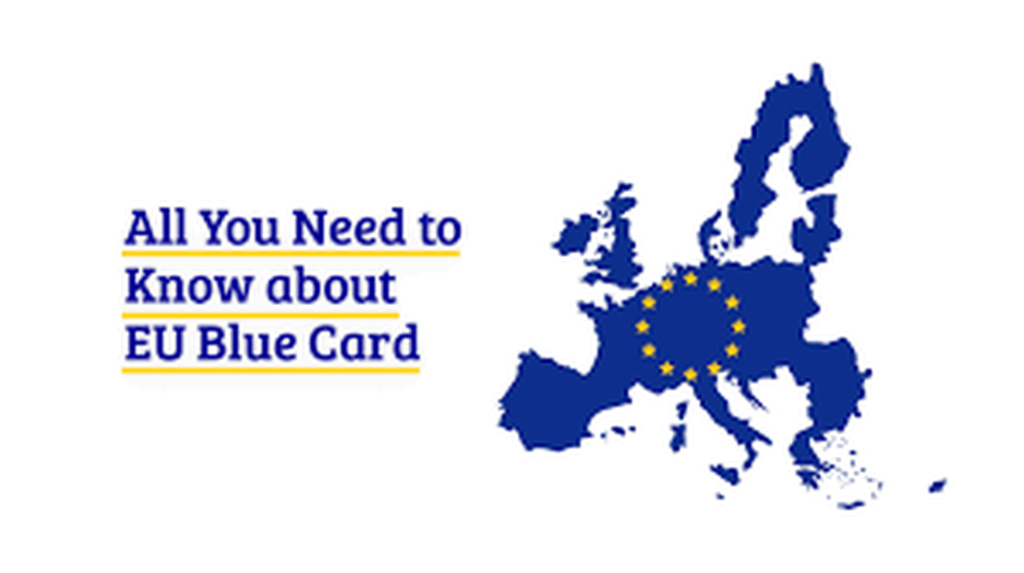All you need to know about EC Blue Card- Application Process, Fees and Processing time

All you need to know about EC Blue Card- Process to Apply- Fees and timelines
The European Union (EU) Blue Card is a work and residency permit that is issued to highly skilled professionals from non-EU countries. The Blue Card system is aimed at facilitating the entry and stay of skilled professionals from outside the EU to help fill gaps in the EU’s labor market.
The EU Blue Card was first introduced in 2009 and is valid for up to four years. It can be renewed for another four years if the conditions for obtaining it are still met. The EU Blue Card is recognized in all EU member states, except for Denmark, Ireland, and the United Kingdom.
Eligibility top Apply for EC Blue Card
To be eligible for the EU Blue Card, applicants must meet certain requirements. These include:
Qualifications:
Applicants must hold a university degree or equivalent qualification, such as five years of professional experience.
Job offer:
Applicants must have a job offer or a binding job offer in an EU member state that pays at least one and a half times the average gross annual salary in that country.
Valid travel document:
Applicants must have a valid passport or other travel document.
Health insurance:
Applicants must have health insurance that covers all medical treatment in the EU member state where they will work.
No threat to public policy or security:
Applicants must not be considered a threat to public policy, security, or health.
Once an applicant has obtained the EU Blue Card, they have the right to work and live in the EU member state that issued the card. They also have the right to move to another EU member state after 18 months of employment, provided they have a valid job offer in the new member state that meets the EU Blue Card requirements.
The EU Blue Card also offers certain benefits to its holders.
These include:
Equal treatment:
EU Blue Card holders are entitled to the same working conditions and benefits as EU nationals.
Family reunification:
EU Blue Card holders can bring their spouse and children to the EU.
Travel: EU
Blue Card holders can travel freely within the Schengen Area without the need for a visa.
Long-term residence:
After five years of legal residence in an EU member state, EU Blue Card holders may be eligible for long-term resident status, which allows them to live and work in any EU member state.
EU Blue Card is a work and residency permit that allows highly skilled professionals from non-EU countries to work and live in the EU member state that issued the card. It is aimed at filling gaps in the EU’s labor market and offers certain benefits to its holders, such as equal treatment, family reunification, and the right to travel freely within the Schengen Area.
Eligibility to apply for EC Blue Card
The European Union (EU) Blue Card is a work and residency permit designed for highly skilled professionals from non-EU countries who want to work and live in an EU member state. To be eligible for the EU Blue Card, applicants must meet certain requirements, which include:
Qualifications:
Applicants must hold a university degree or equivalent qualification that is equivalent to at least three years of higher education. In some cases, five years of professional experience may be considered equivalent to a university degree.
Job offer:
Applicants must have a job offer or a binding job offer in an EU member state that is relevant to their qualifications and that pays at least one and a half times the average gross annual salary in that country. The job offer must be for a minimum of one year.
Valid travel document:
Applicants must have a valid passport or other travel document.
Health insurance:
Applicants must have health insurance that covers all medical treatment in the EU member state where they will work.
No threat to public policy or security:
Applicants must not be considered a threat to public policy, security, or health.
In addition to the above requirements, applicants may also be required to provide evidence of their qualifications, such as transcripts and diplomas. They may also need to undergo a medical examination and provide a police certificate from their home country or any country where they have lived for more than six months in the past five years.
Once an applicant has met the requirements for the EU Blue Card and has obtained it, they have the right to work and live in the EU member state that issued the card. They also have the right to move to another EU member state after 18 months of employment, provided they have a valid job offer in the new member state that meets the EU Blue Card requirements.
It is important to note that the requirements for the EU Blue Card may vary slightly between EU member states. Therefore, applicants should consult the relevant national authorities to ensure they meet all the requirements for obtaining the EU Blue Card in their chosen EU member state.
In summary, to apply for the EU Blue Card, applicants must hold a university degree or equivalent qualification, have a job offer in an EU member state that pays at least one and a half times the average gross annual salary, have a valid travel document, have health insurance that covers all medical treatment, and must not be considered a threat to public policy, security, or health. They may also need to provide evidence of their qualifications, undergo a medical examination, and provide a police certificate.
Application process for EC Blue Card
The application process for the EU Blue Card may vary slightly depending on the EU member state where the applicant intends to work and live. However, the general steps for obtaining an EU Blue Card are as follows:
Check eligibility: The first step in the application process is to check if you meet the eligibility requirements for the EU Blue Card. As discussed earlier, you must hold a university degree or equivalent qualification, have a job offer in an EU member state that pays at least one and a half times the average gross annual salary, have a valid travel document, have health insurance that covers all medical treatment, and must not be considered a threat to public policy, security, or health.
Submit application: Once you have confirmed your eligibility, you can submit your application for the EU Blue Card. This can usually be done online, although some EU member states may require a paper application. You will need to provide personal information, details of your qualifications and work experience, and a copy of your job offer.
Verification of documents: Once you have submitted your application, the relevant national authorities will verify your documents and qualifications. This may involve contacting your university or previous employers to confirm the information you have provided.
Interview: Depending on the EU member state, you may be required to attend an interview as part of the application process. This will typically involve answering questions about your qualifications, work experience, and job offer.
Decision: After completing the verification and interview process, the national authorities will make a decision on your application. If your application is approved, you will be issued with an EU Blue Card, which will allow you to work and live in the EU member state that issued it.
It is important to note that the processing time for EU Blue Card applications can vary between EU member states. In some cases, it may take several months to receive a decision on your application. It is therefore advisable to submit your application well in advance of your planned start date.
In summary, the application process for the EU Blue Card involves checking your eligibility, submitting an application, verification of documents, attending an interview (if required), and receiving a decision from the relevant national authorities. The exact process may vary slightly depending on the EU member state where you intend to work and live.
Application fee for EC Blue Card
The application fee for the EU Blue Card can vary depending on the EU member state where the applicant intends to work and live. In general, the fee ranges from €100 to €300.
It is important to note that some EU member states may also charge additional fees for services such as processing, issuing, and renewing the EU Blue Card. These fees can also vary between member states.
Additionally, in some cases, employers may be responsible for paying the application fee on behalf of their employees.
Applicants should check with the relevant national authorities to confirm the exact fees and any additional charges that may apply to their EU Blue Card application.
Timelimit for Processing EC Blue Card Application
The time limit for the decision on an EU Blue Card application may vary depending on the EU member state where the application is submitted. However, according to the EU Blue Card Directive, the decision should be made within 90 days of the application being submitted.
In some EU member states, the decision may be made much faster than this, typically within a few weeks. However, in other member states, the decision-making process may take the full 90 days or even longer.
If the relevant national authorities require additional information or documentation, this may cause delays in the decision-making process. In such cases, the authorities may contact the applicant to request the necessary information, which may extend the time it takes to reach a decision.
It is important to note that the 90-day time limit for a decision applies to the initial application only. If an application is rejected, the applicant may be able to submit an appeal or a new application, which may take additional time to be processed.
In summary, the time limit for the decision on an EU Blue Card application is 90 days from the date of submission. However, the decision-making process may take less time in some EU member states, while in others it may take the full 90 days or longer. Delays may occur if additional information or documentation is required, and the time limit only applies to the initial application.

 Recent Changes to Canada’s Work Permit Rules and its impact on Immigrants from India
Recent Changes to Canada’s Work Permit Rules and its impact on Immigrants from India  Applications for UK Immigration witness major decline as the Immigration Laws undergo significant changes
Applications for UK Immigration witness major decline as the Immigration Laws undergo significant changes  Recent Changes to Canada’s Temporary Foreign Worker Program (TFWP) Effective May 1, 2024
Recent Changes to Canada’s Temporary Foreign Worker Program (TFWP) Effective May 1, 2024  Immigration Process to Latvia and Job Prospects
Immigration Process to Latvia and Job Prospects  Notario Fraud- a rampant fraudulent practice trapping immigrants to US and Canada
Notario Fraud- a rampant fraudulent practice trapping immigrants to US and Canada  Canada Immigrant Investor Program 2024- loaded with many good features- Check out here
Canada Immigrant Investor Program 2024- loaded with many good features- Check out here  What actions by Trump Government are in store for illegal immigrants in US? What are Challenges to deport illegal immigrants from US?
What actions by Trump Government are in store for illegal immigrants in US? What are Challenges to deport illegal immigrants from US?  What are changes in Canada Start up Visa Program and Self-Employed Persons Program. How would it affect the potential immigrants to Canada?
What are changes in Canada Start up Visa Program and Self-Employed Persons Program. How would it affect the potential immigrants to Canada?